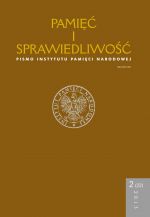Wyobraźnia (historyczna) i jej rola w procesie badania przeszłości
The historical imagination and its role in the study of the past
Author(s): Marek WoźniakSubject(s): History, Social Sciences
Published by: Instytut Pamięci Narodowej
Keywords: Cognition; image of the past; imagination; memory; experience; world view; culture
Summary/Abstract: The critic of the fundamental foundations of the traditional historiography was/is particularly influential from the point of view proposed by widely understood constructivism. It questioned that reality is something external and independent from cognition, and that the truth or falsity of its results depends on the nature of the world. In light of constructivism knowledge cannot be treated as an effect of the relation between the subject and object, its shape is not defined by the external world and, finally, that the scientific apparatus does not provide an adequate image (description) of the world (independent from culture). In this way from the constructivists’ conceptions of history we cannot say that “the past is real”, at least, “not the past as it is used by historians”. The images of the past are therefore a construction and are intelligible, not because of their own nature, but because of the a priori criteria which establish their intelligibility and which contribute to the knowledge of historians or the society in which they operate. Historians can be perceived as a part of the whole system, and their social credibility depends not only on (historical) sources, but on the fact that their discourse has its roots in cultural, social and linguistic prejudices that shape our perception of reality (or the past).Within the framework of these changes the category of (historical) imaginationand its part in possible images of the past formulated by historians arouses special interest. From this point of view we can see (historical) imagination as a tool participating in constructing images of the past. Reflection on historical imagination in this way can lead to showing in new light not only the cultural prejudices of historical cognition (historical studies), but above all the reason for the necessity to reformulate the investigative programs and the forms of representing the past. The problems and questions raised in the article derive perhaps only from necessity a fundamental change of our relation to imagination. So in everyday life, the media, art, literature, and also scientific discourse, imagination – often even in defiance of arguments that some time appear in social and scientific circulation –is identified as “fiction and fantasy”, and leads to it being treated as an alternative for “truth and reality”. Meanwhile, it seems that likewise we do not think about a given culture that is true or false, so we should not also bring discussion on imagination into problems of its falsity or fictionality irrespective of whether we treat imagination as a “child of culture” or inversely, culture as a “child of imagination”. However, we wish to emphasize at this point, that it is not our intention to suggest that (historical) imagination is the (essential or crucial) tool of cognition of past reality, but rather we ask if imagination has such an essential part inhistorical knowledge, can we perceive it in the investigative practice of historians. Therefore, we do not try to force the thesis that the stories composed by historians are the work of imagination, but rather that representation (re-presence) of the past is possible with, or even thanks to, (historical) imagination.
Journal: Pamięć i Sprawiedliwość.
- Issue Year: 22/2013
- Issue No: 2
- Page Range: 41-53
- Page Count: 13
- Language: Polish

